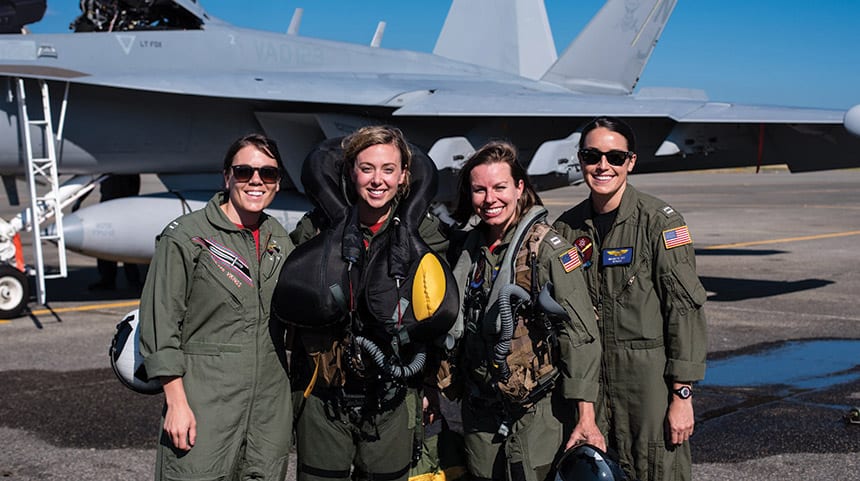
After advancing to the final round of Berkeley Law’s Halloum Business Competition, Elizabeth Hall ’20 engaged in a high-octane negotiation before three judges and a packed audience. For most law students, the scene would be nerve-racking.
Most law students, however, have not led airborne combat missions over Afghanistan, Iraq, and Syria. As a Navy Flight instructor and weapons system officer, Hall logged 1,600 hours and 250 carrier landings in an F/A-18 Super Hornet—the Navy’s most advanced tactical aircraft.
“The most challenging part was managing stress in the cockpit while trying to solve a complex problem or make a leadership decision that could have grave consequences if I was wrong,” she says. “It was gratifying, at age 27, being trusted to serve as mission commander for two fully loaded F/A-18s flying hundreds of miles away from the ship.”
Hall also trained pilots to operate the jet’s combat systems and taught tactics in a classroom setting, through flight simulators, and in the actual aircraft.
Military aviation and naval service run in her family, and Hall was a high school freshman in Allentown, Pennsylvania, on 9/11. “I think a sense of duty also contributed to my decision,” she says of enlisting.
At the Naval Academy, her interest in law intensified. Hall later served as a legal officer, advising commanding officers on misconduct or law-related issues within her squadron. She consulted with JAGs about actions to take after incidents, gathered facts, interviewed witness, compiled reports, recommended and coordinated non-judicial punishment, and forwarded cases to NCIS if needed.
While working with Australian military personnel on Whidbey Island in Washington, Hall also helped recruit and integrate women into combat roles with the Royal Australian Air Force.
“They have very few women in their fighter aviation community and training pipeline, far less than the U.S.,” she says. “I was honored to meet and provide mentorship to young women who lack a female role model in that space.”
At Berkeley Law, Hall sees the growing presence of veteran students and programs enhancing the school’s collective learning environment. “My classmates are so kind and interested in my military experiences,” she says.
—Andrew Cohen